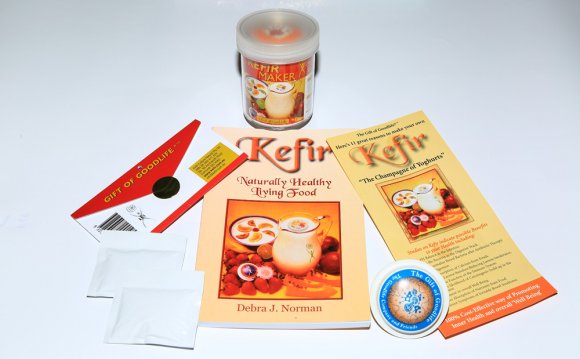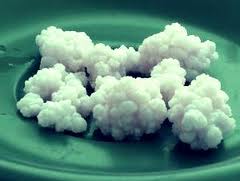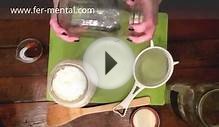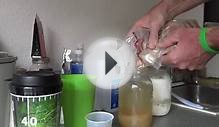
If you want to make your own then you can use traditional kefir grains or a commercial powdered starter culture.
If making homemade kefir is new to you, then you will probably want to learn more about these different starter cultures before you decide which one to use. Have a look at our information below and decide for yourself which type of starter is for you!
Powdered Kefir Starter
Powdered kefir starter is commercially produced. You can usually buy this type of kefir starter as a single or multi-pack. This type of preparation contains a limited number of probiotic organisms, which are usually listed on the packet under "ingredients". Powdered kefir starter should be stored under refrigeration.
Pros
Powdered kefir starter is easy to use and is therefore ideal for first time users. It is prepared in a sterile environment and cultured commercially. The benefit of the latter is that the product ingredients include a comprehensive list of all the and beneficial yeasts contained in the product. If you choose a powdered kefir starter therefore, you know exactly which beneficial organisms you are using and ultimately ingesting.
You can also buy individual sachets of commercial kefir for around $5 USD. This makes it relatively cheap to try making your own kefir.
Cons
The downside of commercial kefir starter is that you generally cannot use these cultures over and over again. At best and depending on the brand you buy, you may get around six batches of kefir out of your sachet of commercial starter culture. However be aware that the number of recultures from your sachet may be considerably lower than six. In the long term therefore, this makes commercial kefir starter culture more expensive than the grains, which can be used over and over again.
Kefir Grains

Kefir grains are a mixture of probiotic bacteria and beneficial yeasts in a base of fat, sugar and protein.
Contrary to their name, these "grains" do not contain cereal of any kind. However they do generally contain dairy, specifically milk casein. Some non-dairy alternatives to milk-based kefir grains are now available. These can be used to make water kefir and coconut kefir
YOU MIGHT ALSO LIKE




 Saturated fat is fat that consists of triglycerides containing only saturated fatty acids. Saturated fatty acids have no double bonds between the individual carbon atoms of the fatty acid chain. That is, the chain of carbon atoms is fully "saturated" with hydrogen...
Saturated fat is fat that consists of triglycerides containing only saturated fatty acids. Saturated fatty acids have no double bonds between the individual carbon atoms of the fatty acid chain. That is, the chain of carbon atoms is fully "saturated" with hydrogen...








